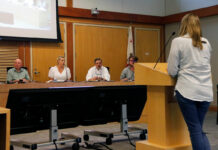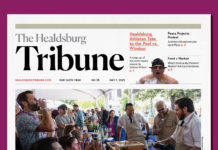Healdsburg’s GMO (Growth Management Ordinance) is a complicated citizen’s initiative that was passed in 2000. In essence it limits the number of homes that can be built in a given year to 30. Since then the population has increased by less than 500 people. It is very difficult to provide housing opportunities for working folks in our community as median home prices have risen dramatically, inventory shrinks and nearly one third of re-sales are for second homes. Two years ago a committee was formed to look at amending the GMO. A compromise was reached that would give us a few more units for a 15 year period and then revert back to the current GMO. It wasn’t perfect, actually far from it. The original author of the GMO measure attended and spoke at the meetings. However he would not support even the modest changes the committee proposed, but agreed to remain neutral. He insisted that the GMO wasn’t broken and didn’t need a fix.
Since then, the city has completed the Central Healdsburg Area Plan (CHAP), a Strategic Plan with a large amount of community input and is working on a new housing element document for the state of California. The need for housing has come up while working through all of these projects – specifically multi-family units (apartments) and homes for people of moderate incomes – teachers, police officers, nurses and many others. However the constraints of the GMO make it difficult to achieve the economy of scale needed to allow most projects of any significance to be viable. No member of the council is advocating for big growth in our community. However, I find myself advocating for some opportunity that will allow the children and grandchildren of residents to live here in Healdsburg, and for people who work here to have a chance to live here as well.
Much has been said in recent months by some that Healdsburg is potentially “losing its small town charm” because of tourism, wine and food. I see a bigger threat to our town character. Without the ability to have additional housing and types of housing, we will continue to see higher prices for homes and more second home owners. We will see the multi-generational families continue to disappear and there will be fewer young families with children in our schools (Healdsburgers are already older and grayer than their neighbors to the north and south). We will continue down a path towards losing our diversity as a city.
Two weeks ago, the city council voted to not put the GMO amendment on the ballot in favor of a future ballot measure that more accurately reflects the needs of the people who live and work here. As we continue to diversify our economic base, we need to diversify our housing opportunities.
It is important to recognize all the time and energy Councilmember Tom Chambers and the committee put into an effort to propose a GMO amendment. I appreciate the frustration some may feel with the action Council took not to put this item on the ballot for now. Some have said that “the council got scared off by a small faction of people who want to stop growth at all costs.” I disagree. With the additional information in the housing element, CHAP Plan, and Strategic Plan, it is important that any potential changes made to the GMO be right the first time. Moving forward with a compromise measure won’t solve the challenges we face. We may only get one bite at this apple and it will be sweeter if it is the right apple for Healdsburg.
Jim Wood is the Mayor of Healdsburg.








